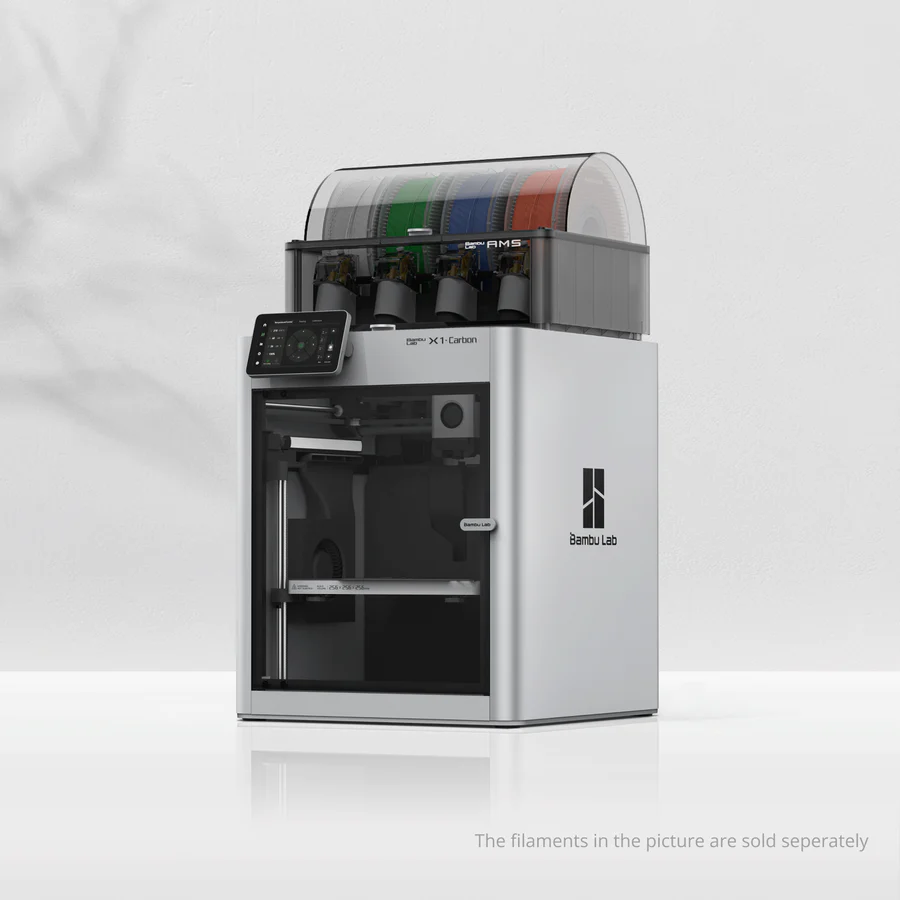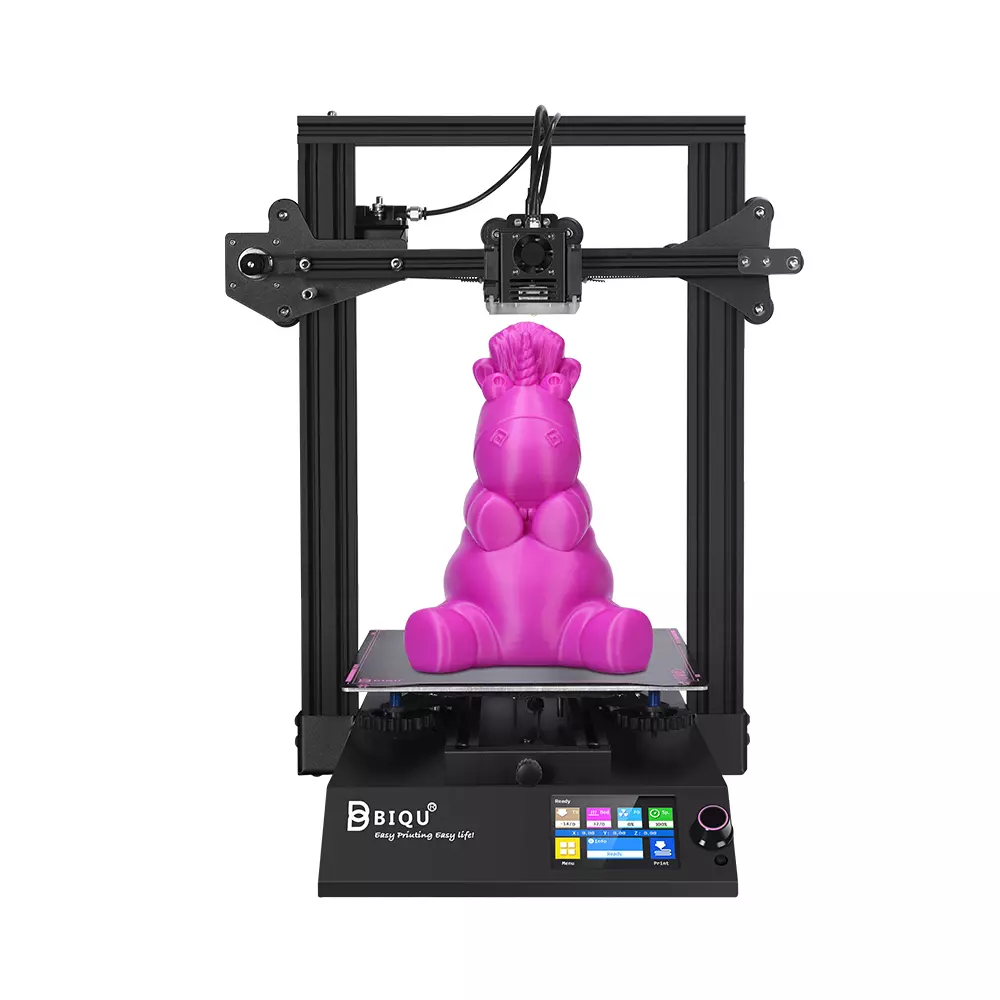Compare X1 carbon vs BIQU B1
Comparison between the best 3D printers
Choose the best 3D printer at the best price. The cheapest 3D printers are here.
Buy a 3D printer here with 3D Fila.
 |
 |
|
| Model | X1 carbon |
BIQU B1 |
| Printing Material | Filament | Filament |
| Buy Filament for Bambu Lab X1 carbon | Buy Filament forBigTreeTech BIQU B1 | |
| Estimated price | $1449,00 | $269,00 |
| Manufacturer | Bambu Lab | BigTreeTech |
| Release Year | 2023 | 2020 |
| Print Volume [mm] | 256x256x256 | 235x235x270 |
| Printer Size [mm] | 389x389x457 | 412x402x492 |
| Weight [kg] | 14,13 | 8,00 |
| Power Loss Recovery | YES | YES |
| Enclosed printer | YES | NO |
| Bed Leveling | Automatic | Manual |
| Filament End Sensor | YES | YES |
| Bed type | Heated | Heated |
| Power supply system | Direct Drive | Bowden |
| Standard nozzle | 0,4 | 0,4 |
| Maximum Nozzle Temperature [°C] | 300 | 250 |
| Maximum Bed Temperature [°C] | 120 | 100 |
| Maximum printing speed [mm/s] | 500 | 100 |
| Filament holder | YES | YES |
| Camera for supervision | YES | YES |
| Recommended filaments | PLA, PETG, TPU, PVA, PA, PA-CF, Nylon, PC | PLA, TPU, ABS, PETG |
| Recommended slicers | Bambu Studio, Super Slicer, Cura, Prusa Slicer, Orca | Cura, Simplify, Slic3r |
| Maximum Resolution [mm] | 0,1 | 0,1 |
| Processor | Quad ARM A7 1.2 GHz | 32 Bits BTT SKR V 1.4 |
| Display | Touchscreen 5'' | Touchscreen TFT 3,5'' |
| Power Supply | 350 W | 24V / 360W |
| Connectivity | Wifi, Bambu bus, Cartão SD | SD / USB |
| Operating systems | Windows, Linux, Macbook | Windows, Mac, Linux |
| Date of registration in the system | 2024-04-10 | 2021-04-14 |
| Release date | 2023 | 2020 |
| Extra features | The Bambu Lab X1 Carbon revolutionizes 3D printing with stunning design, high print speeds, and a streamlined user experience. It stands out with its CoreXY system, a hotend capable of reaching 300°C, allowing for a wide range of filaments. Its LiDAR-assisted bed leveling system, vibration compensation, and AMS multicolor printing capability raise the industry standard. Print quality is impressive, with the ability to fine-tune for perfection. The X1 Carbon, with its closed build volume, not only promises but also delivers one of the most advanced 3D printing experiences available to consumers. | The BIQU B1 is an advanced 3D printer with a silent 32-bit BTT SKR V1.4 motherboard and ARM Cortex-M3 CPU, offering DIY interfaces (I2C, SPI, WiFi) and dual Z-axis. Its dual BTT B1 TFT35 V3.0 operating system allows real-time monitoring and multiple printing modes, including G-code visualization effects. It stands out for its BIQU SSS (Super Spring Steel), ensuring easy model adhesion and simplified removal, with the possibility of using it on both sides. It includes a filament sensor, automatically pausing printing in case of filament breakage. The multicolored RGB lights integrated into the hotend allow you to view the printing status even at night. Additional notes include the need for a BIQU-specific Type-C cable and extra interfaces for smart filament sensor and BL Touch. |
| Support for multiple colors and materials (AMS and CFS) | YES | NO |
Notes * |
||
| Cost-benefit | 7 / 10 | 7 / 10 |
| Hardware | 6.4 / 10 | 2 / 10 |
| Tela | . | . |
| Print volume | 4 / 10 | 3 / 10 |
| Performance | 4 / 10 | 1 / 10 |
Conclusion |
| In comparing the Bambu Lab X1 Carbon and the BIQU B1, several key factors highlight the strengths and weaknesses of each 3D printer. The Bambu Lab X1 Carbon, priced significantly higher, offers advanced features that cater to enthusiasts and professionals. Its impressive build quality is evident in its closed design, automatic bed leveling, high maximum printing speed, and an extensive range of compatible filaments, including high-performance materials. The inclusion of LiDAR technology for bed leveling, a high-temperature hotend, and multicolor printing capabilities further enhances its functionality. This model excels in performance and print quality, making it suitable for demanding applications in the maker community, despite its higher cost. On the other hand, the BIQU B1 presents a more budget-friendly option, making it accessible for newcomers or those with light 3D printing needs. While it lacks some of the advanced features of the X1 Carbon, such as automatic bed leveling and a closed build environment, it still offers solid performance with a heated bed and good compatibility with popular filament types. The BIQU B1 is user-friendly and provides essential features like a filament sensor and real-time monitoring, making it a practical choice for hobbyists. In summary, the choice between these two printers largely depends on the user’s requirements and budget. For those seeking high performance, functionality, and versatility in materials, the Bambu Lab X1 Carbon is the clear winner, justifying its cost through superior features. Conversely, the BIQU B1 offers excellent value for beginners and casual users, delivering reliable performance at a much lower price point. Ultimately, the best option will align with the specific needs and priorities of the user, whether that be advanced capabilities or cost-effectiveness. |

